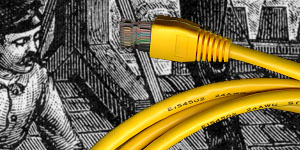


Gossip Makes the World Go 'Round
A few hundred thousand people now carry portable computers and use them to link up with worldwide computer networks. What these people do today suggests interesting social and political changes for all of us in the future. For example, armed with today's computer technology, many corporations judge our creditworthiness, insurance-worthiness, and so on. So why don't we, in turn, judge them?Today, most of us identify good and bad restaurants by asking friends or by reading restaurant reviews written by experts. But taste is a variable thing, and experts are both expensive and scarce. What if everyone who ate at a restaurant could post a quick review to the electronic networks for anyone to read? Bad businesses might die faster, and good ones might do better faster. Electronic word-of-mouth could let everyone consult past customers' opinions.
If that sort of thing could work for restaurants, why not shops and banks? For example, some groups on the computer network currently post reviews of travel agents, illustrating them with accounts of personal experiences. But if travel agents, why not doctors, lawyers, and stockbrokers? Doctors have enormous power over patients, partly because of their extensive training but also because of their continuing sources of information. They have far more information about us---both in the mass and individually---than we do about them. The same is true for priests, and lawyers, and police officers. That's why we have laws preventing these privileged groups from exploiting their special advantages.
What happens, then, to that ancient balance of power when anyone can connect to a worldwide, or at least citywide computer network and read other patients' opinions of various doctors and treatments? Or of bankers, claims adjusters, real estate agents, stockbrokers, and government officials. What kind of world might it be where any one of us can have almost as much knowledge as doctors and banks? Electronic networks of communicating strangers gossiping about who's good and who's not, what's good and what's not, might empower a true democracy---a true global village. But it will surely also destabilize the ancient power relationships we today take for granted.
In any case, such a paradise probably couldn't last. Inevitably, some contributors will become more respected than others, either through superior communication skills, greater trustworthiness, or higher social standing. They will then implicitly set standards of acceptability for various things---just as Variety sets standards for many movies and the New York Times Book Review sets standards for many books. Some of the most respected critics will then arrange to be rewarded for their efforts. Most of us, relieved from having to sift the good from the bad, will pay. Of course, some reviewers will sell out or be bullied out, but a few will stick to their intellectual guns. Perhaps they'll publish their electronic views in something called The Hourly Rant.
Further, we could evaluate people just as easily as businesses and professionals. If you met some people you wanted to know, you---or more likely your electronic pets---might dig up everything they had written on the computer network and everything anyone else ever said about them professionally or informally. Think how social relationships might change if prospective partners meeting at a bar could check up on each other while still at the bar. What might become of our notions of personal privacy?
On the other hand, not everyone will have the money, technical competence, or background to buy and use the new machines. Even today, some people in advanced countries don't have telephones. But a telephone is one thing; a line into near-priceless information sources is another. What will become of these people?
Will the technologically adventurous continue to accelerate the difference between the increasingly enormous amounts of information at their fingertips and the relatively meager amounts at everyone else's? If so, what might become of our societies? What about the huge populations in poor countries who can't even afford telephones? Will we correct the massive differences between what they can do and what we can do? Or will the disparity simply grow worse?